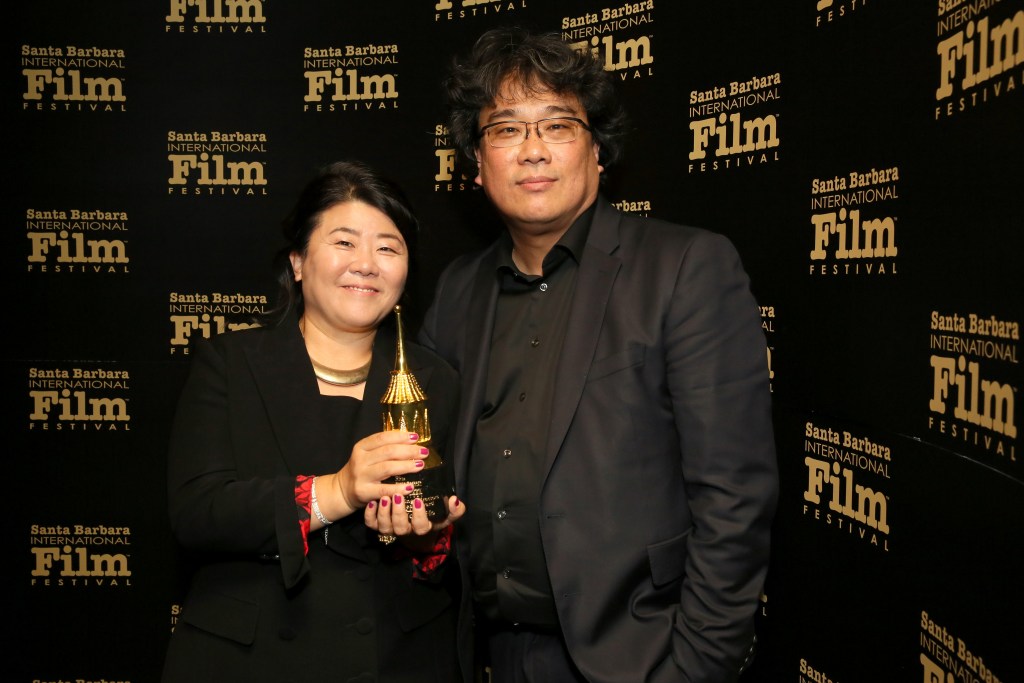On Thursday, January 23, the Santa Barbara International Film Festival honored Bong Joon-ho with the Outstanding Director of the Year award for his directing accomplishments. Following a montage of his filmography, the Oscar nominated director, accompanied by his translator, Sharon Choi, crossed the stage and was met with a standing ovation.
Under executive director Roger Durling, the Santa Barbara International Film Festival has flourished by riding the awards season wave through an abundance of onstage interviews with Oscar contenders. The Directors Panel has in recent years varied in format, consisting of anywhere from one to five directors. This year’s audience reveled in the delightful company of only Bong Joon-ho and video snippets journaling his enthralling career. The night not only served as a push on his path to the Academy Awards but also as a moment to commemorate Joon-ho’s boundary resisting ability to transcend South Korean film in its 100th year of cinema.
Moderated by Hollywood Reporter columnist Scott Feinberg, the evening was an in-depth look at both the upbringing and evolution of Joon-ho’s illustrious filmography. Making the rounds this awards season, Bong Joon-ho has been a recurring name, thanks to 2019’s Parasite, which isone of the year’s most critically acclaimed films. Before exploding into mainstream consciousness with Parasite, Joon-ho delivered a variety of genre-defying films such as Okja, Mother, and Snowpiercer each of which contain witty humor and unorthodox storytelling. His first film is Memories of Murder, a story based on real happenings within South Korea and the inability of local police investigations to solve tragic murders.
“Before a film is categorized into a genre such as ‘serial killers, thrillers’ it’s really just about chaos in and of itself,” explained Joon-ho. The director described how the chaos of Korea in the 1980s plays a pivotal aspect in defining Memories of Murder. As well as being the film that launched his career Memories also was the beginning of a relationship between the director and actor Kang-Ho Song, who plays the father of the poor family in Parasite. “From the very beginning I knew he was the only actor that could play that role, I wrote this with him in mind,” shared Joon-ho. “He was the only person who could represent the face of Korea in the ’80s and he has an animalistic instinct for comedy, an actor who has it all.”
Joon-ho confessed that behind the scenes he emulates movie making methods of Alfred Hitchcock. “I’ve heard you storyboard everything, very detailed like Alfred Hitchcock,” stated Feinberg. “On the other hand you’ve said you love nothing more than when your actors improvise so how can both be true?”
“I consider Hitchcock my mentor, he’s a filmmaker I greatly admire,” said Joon-ho, “but I don’t share the same philosophy’s as Hitchcock…I want the actors to feel as comfortable as possible, like they’re fish fresh out of water free to flap around whenever they want.”
Along with a sharp knowledge of cinema history and historical figures in film, Joon-ho reveled a whimsical humor, eliciting laughs from the audience — just as he does in his movies. After viewing a clip of his film Okja, a story about an abnormally large, genetically modified pig who befriends a little girl, Joon-ho giggled and said, “What a strange movie, why did someone shoot that movie?”
Although unconventional and unlike one another, Bong Joon-ho’s films, such as Parasite and Memories of Murder, eloquentlyillustrate a juxtaposition in themes and serve similar purposes in telling narratives about society. With seven films and 25 years of experience under his belt, Joon-ho has evolved into one of the world’s most talented directors. Through meshing societal concepts with unique stories, the director raises awareness while simultaneously entertaining audiences with visual richness and impeccable characters. There is no doubt that Bong Joon-ho will be known as an Outstanding Director for years to come.

